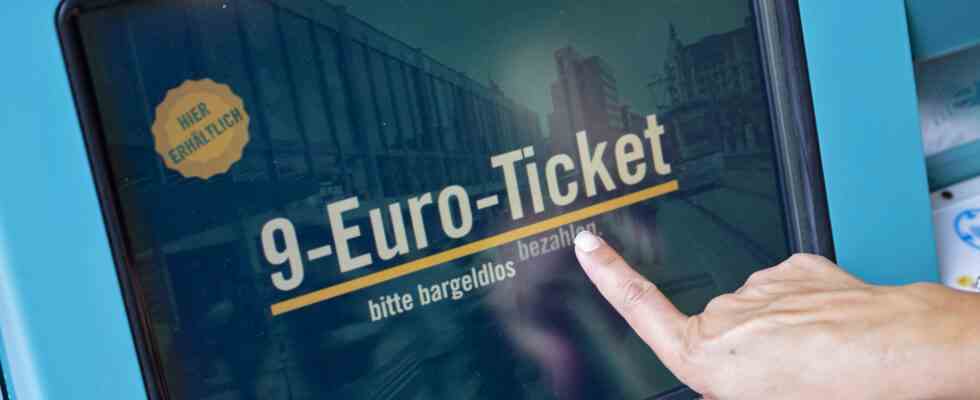Status: 09.07.2022 2:26 p.m
Minister of Transport Wissing praises the success of the 9-euro ticket – and promotes local transport tickets that are valid nationwide. But how exactly can things continue after August? Opinions differ on this.
It was the Federal Minister of Transport’s undisputed favorite sentence: “This ticket already has a firm place in the hearts of people in Germany,” Volker Wissing repeated at every opportunity at the start of the 9-euro ticket at the beginning of June.
Today, the FDP politician sounds even a bit more euphoric: Wissing calls the traffic light idea with the cheap ticket for three months a “brilliant success”: There is noticeably less traffic on the streets and significantly fewer traffic jams. The Greens politician Nyke Slawik sounds very similar: “The 9-euro ticket is already a highlight of our traffic light coalition.”
The left demands an extension
According to the Association of German Transport Companies (VDV), as of the end of June, ten million subscribers and around 21 million other customers nationwide had purchased the 9-euro ticket. But how should things continue at the end of August? And how to prevent the highlight from quickly fading away again?
The left calls for the 9-euro ticket to be extended until the end of the year. And then permanently low prices for bus and train: “First of all, this should be the 1-euro ticket, namely 1 euro a day. As leftists, we also demand that the use of buses and trains be possible in the medium term for free.” That’s what left leader Janine Wissler said in the Bundestag.
These are very concrete, albeit expensive, ideas that the Social Democrats call “removed from reality”. The traffic policy spokeswoman for the SPD parliamentary group in the Bundestag, Dorothee Martin, sees the great advantage of the 9-euro ticket in its simplicity: “So get on, drive, get off – and it’s good.”
Evaluate first, then possible connection solution
Transport Minister Wissing’s thoughts seem to be going in a similar direction when he thinks aloud about the post-9-euro ticket phase. Wissing is primarily concerned with ending what he calls the wage jungle that prevails in Germany. “If the complicated tariff zones disappear and the tickets are valid nationwide, local public transport will be used much more,” said the FDP politician of the “Neue Osnabrücker Zeitung”.
Wissing left open whether there will still be inexpensive offers for bus and train after the 9-euro ticket expires at the end of August. Everything will now be evaluated first, and the necessary conclusions will be drawn from autumn. “Let’s use the summer to find a connection solution for the 9-euro ticket,” warns Green politician Slawyk.
Union refers to rural population
But what could that look like? How can it be possible not to scare away those who literally “boarded” the bus and train? The FDP has almost ruled out that the 9-euro ticket will be extended. That would be way too expensive.
In the Union, people are skeptical anyway: the poorly connected rural population would not use cheap fares anyway, criticizes the Reutlingen CDU member of the Bundestag Michael Donth, with him on the Alb the enthusiasm for the ticket is limited: “Because it also travels completely surprisingly not a single bus there for 9 euros a month.”
The neglected rural population, the enormous backlog in the expansion of the rail network – there is a lot to think about when the traffic lights start thinking about the time after the 9-euro ticket in summer. And about the question of how to prevent it from leaving its “permanent place in people’s hearts” – as Wissing put it – all too quickly.

